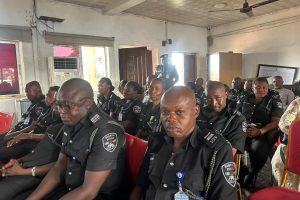Federal Ministry of Health Information Release.
Thursday, 28th May, 2020.
Highlight of response by HMSH, Dr. Olorunnimbe Mamora to questions from Journalists at the PTF on COVID-19 Briefing held on Wednesday, 27th May, 2020.
On the “COVID-19 index case in Benue State that was discharged last week but still tested positive after 45days.”
HMSH Dr. Mamora said “Specifically you mentioned 45days and you sought know if it is proper to have discharged even when she still tested positive as at that time. Well, what we know is as for some reasons, certain patients may not easily stop quote and unquote shedding the virus, that is, they have a prolonged period of viral load shedding and that could be one of such cases; but let me quickly say that her discharge was predicated on a follow-up; she was asked to self isolate, so it was kind of a supervised self isolation because since she was on admission she wasn’t manifesting any symptoms to start with and she wasn’t going home, in anyway, and also she wasn’t taking medication which is not unusual. But there are people even without taking any medication, they will still recover and of course, knowing full well that there is no cure and no specific treatment for COVID-19, a patient with COVID-19 will rely largely on his or her immune response or system to overcome and overwhelm the virus.”
“Whatever treatment that is given so far is only supportive, so that is the situation; I’m hoping that somehow, somewhere along the line, she will still be tested and will return a negative. It is also important to say that corona virus particularly as COVID-19 is still being studied, so every day you have research work published that is, we continue to rely on times, we rely on data and rely on evidence and one of the latest findings is that there may be some viral particles still left in the patient’s system which will be picked up when test is done; so, she may have been one of such patients. I’m sure Dr. Chikwe and the National Coordinator will surely talk more about this, I think from my own end that is the bit I can say.”
On issues with hazard allowances:
“You may recall that when I first presented this issue, I did say that we have an MOU signed by officials of the Ministry of Health; I led the team for the Ministry of Health; the Ministry of Labour and Employment; the National Salaries and Wages Commission; the NMA, the Pharmaceutical Society of Nigeria; Nigeria Nurses and Midwives; the Medical Laboratory Scientist and a whole lot of other bodies under JOHESU; now the decision as at that time was to try and not to reinvent the wheel, that is going by what was already in place by a way of hazard allowance which dated back to 1991 so, the decision was to suspend that because it’s scandalous so to speak, to suspend that and then come up with a new rate to cover this period and also have some kind of inducement in addition to other things that have been put in place like the Employee Compensation Act; Of course, the group insurance as well, now, along the line, there was need to harmonize all these and ensure that the names of those that are to be covered will reflect on the IPPIS platform so that the payment can just be made directly and I am aware that negotiation is still on because of certain developments along the line. As we speak right now, the Permanent Secretary in the Ministry of Health is at a meeting in this regard and I do hope that before the end of the week, the final outcome will be made available which we will let you know.”
On what are the other areas of research aside the medicinal plants that we know of, or that we are working on at the moment with traditional medicine herbal practitioners:
“Now, we are still hoping on drugs, don’t forget that even chloroquine is still being worked on as we speak. It is important for us to make it clear that WHO as the world body that regulates issues that affect health, the WHO does not dictate to countries as to what to do, they only provide guidance and guidelines, not dictate, because the reality is that each country is expected to look at those realities on ground and leave room for innovation, leave room for flexibility and leave room for adaptation as dictated by the realities on ground in each country, so we are still looking at issues of drugs, we are still looking at issues of vaccines as well as the area of research. Often times, what we get is that this is what is happening in America, this is what is happening in Britain, but we need to have our own figures based on Science, based on evidence and of course based on research, for example, I’m sure some of you would have read in some countries abroad, they have established that COVID-19 tends to be more prevalent…..”
On the question on the strain of virus:
One of the things we have not made too much noise about is what we are able to do within. I can confirm to you that from the Nigeria Institute of Medical Research, working in collaboration with some other institutions here in the country, they have been able to establish that the strain we have here, is the same as the strain in Wuhan when it was first discovered, so that has been established and we know that the genetic sequencing has been established to that effect, so it’s that strain that we know for now.”
On the question on what to do or not with the coming of the rains:
“Unfortunately we never had this before, you will need a cycle for you to be able to establish that this is what will happen this time around; this is just the first experience, we didn’t have COVID-19 last year, I mean during the rains last year to be able to say this is what happened then, but we need to wait and see. But having said that, the usual or the routine advices should be kept faith with, that is washing of hands with soap and water under running water, use of sanitizers, alcohol based, use of face mask, avoid gathering, physical distancing and all the other advisories that have been given, so we want Nigerians to continue to follow this advisories. Yes it’s been said that there is a possibility that high temperature, humid environment and what have you may aid, but again this are some of the things that have been said; but regarding what we know, I think the advice is to keep to those advisories and then maintain personal hygiene and respiratory hygiene. I think that’s my response to that.”
On update on Cross-River and Kogi:
“Well, Kogi is yet to be visited the second time, but I can say that we have a better understanding with the Government of Kogi this time around, and we are hoping that when the team visits Kogi we will have a better report based on better understanding. For Cross-River, Yes, we want to commend the Governor for welcoming the team and for the collaboration that took place, better understanding as well, but essentially the findings at the end of the visit, they revolve around the issue of security at the border; inadequacy of surveillance system; and the low capacity for testing because of dearth of personnel to make this testing possible, of course, what was also observed was that the call centre is probably not what it should be, it is yet to still be set up as at that point in time, this situation may have changed now because this was a report of about 2 weeks ago. There was also the issue of difficulty in shipping test samples from Cross-River to Irrua which is possibly the nearest Centre, the Irrua Reference Lab; taking these samples from Calabar, so logistic issue is one of the other things observed in Cross-River. But at the end of it all, there were discussions on how to mitigate these gaps and challenges. Like I said earlier on, we want to acknowledge the cooperation of the Governor of the State in trying to ensure that we both work on the same page, that is with the Federal and State authorities with a view to getting things done properly for the good of us all. Thank you very much.”
Compilation by Blessing Efem, SIO
For: Director, Information, Media & P.R
FMOH.









Add Comment